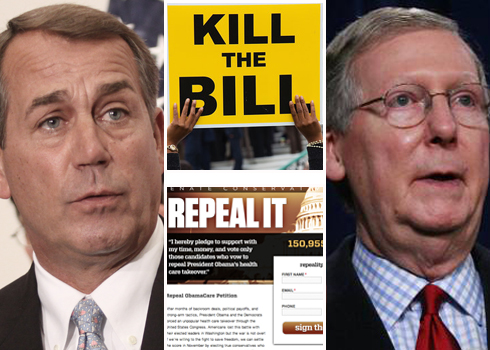Now that health care reform is actually law, Republicans who first attempted to kill it are faced with a key question — would you repeal it? Repeal and revise? Repeal and replace? A full repeal — or just the ‘bad’ parts? Or is repeal the wrong strategy?
Republicans are all over the map on this one.
TPMDC has been keeping a close eye on Capitol Hill Republicans who fought to kill the bill and how they are being forced to transition to a “What next?” scenario. They haven’t landed on a consistent message, though many are leaning in the “repeal and replace” idea pushed by House Minority Leader John Boehner today in a Des Moines Register op-ed in advance of President Obama’s visit to Iowa City. Senate Minority Leader Mitch McConnell has suggested they are settling on “repeal and replace” as their 2010 mantra.
The GOP is facing a new political reality this week, as Democrats have claimed a victory that seemed unlikely earlier this winter.
Now that the health care bill has become law, the dynamic has shifted and the nation’s mood is more supportive of the legislation, polls show. The majority party is now energized and it’s now the Republicans who are looking to make a message gel.
Republican lawmakers successfully campaigned against hypothetical scary things in the bill before it passed — death panels, backroom deals and more. But now that the bill actually is law they are faced with saying what they would do, and that gets more complicated. In several cases, Republican ideas are incorporated into the bill. What’s more, popular elements like tax cuts and ending discrimination based on pre-existing conditions are tough things to say you’d scrap.
Candidates across the country are being goaded into saying they would repeal the bill, but lawmakers on the Hill are being pressed for more specifics. And they aren’t all in agreement.
Boehner (R-OH) says that Republicans would “start fresh” if they win back power in the critical midterm elections. From his op-ed:
That’s why Republicans are fighting to repeal it so we can start over with common-sense reforms that get health-care reform right.
Through repeal, we can do away with these job-killing mandates and replace them with affordable solutions to lower costs and cover Americans with pre-existing conditions. We can repeal these Medicare cuts that take choices and benefits away from seniors to fund a new entitlement program, and replace them with reforms that strengthen Medicare for seniors today and tomorrow. We can repeal these Washington accounting gimmicks and replace them with honest policies where you get what you pay for. And we can repeal all the backroom deals that use money we don’t have to purchase support for controversial legislation.
Republican lawmakers won’t publicly admit there are “good parts” in the bill, though GOP pollsters say they will just leave out references to anything that polls well in their campaign materials. (And of course, it will be those “good parts” such as tax credits and pre-existing conditions changes that Democrats will accuse Republicans of wanting to end.)
Former House Speaker Newt Gingrich did admit the bill has “good” items earlier this week. Gingrich said on Fox that his prediction was the GOP wouldn’t fund the health care reforms and if a new president is elected in 2012, then by “February of 2013, they repeal the entire bill.”
“Replace the good parts. Because there are some things — out of 2600 pages, there are probably 200 pages that are pretty good,” Gingrich said.
Several GOPers already have introduced bills to repeal health care and push repeal petitions online, coupled with the lawsuit threats from attorneys general across the country to deem the legislation unconstitutional. But Sen. Chuck Grassley (R-IA) yesterday took credit for provisions in the health care bill, even though he opposed it.
But, some are walking back the repeal rhetoric. RNC Chairman Michael Steele this week said that GOPers are “not talking about repealing the bill based on the bill, we’re talking about repealing it and replacing it with what doctors and patients want – that’s a big difference.”
And Sen. John Cornyn (R-TX), who leads the National Republican Senatorial Committee, said before the bill passed he thinks the repeal pledge is unlikely to pan out.
The U.S. Chamber of Commerce, which spent millions trying to defeat the legislation, said this week they won’t spend a penny supporting repeal efforts.
A senior administration official told reporters on a conference call last night that the White House isn’t worried about the lawsuits or the repeal legislation. The official said there will be “a vigorous debate played out” asking “Why Republicans want to take away insurance tax breaks for small business,” new consumer protections and the reforms on pre-exisiting conditions.






